May 24, 2025 | 05:06 GMT +7
May 24, 2025 | 05:06 GMT +7
Hotline: 0913.378.918
May 24, 2025 | 05:06 GMT +7
Hotline: 0913.378.918
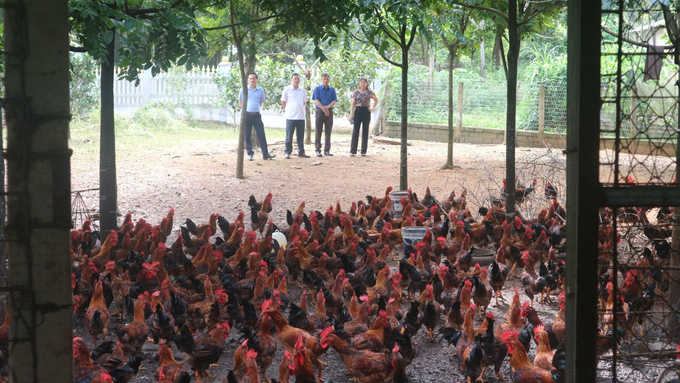
Thai Nguyen livestock industry quickly restored production after suffering natural disasters. Photo: Pham Hieu.
The recent historical disaster in Thai Nguyen province has killed more than 300,000 poultry, and more than 800 cattle, mainly pigs. The damage is concentrated in the farms along the two sides of the Cau River in Phu Luong district, Phu Binh district, Thai Nguyen city, and Pho Yen city. Thai Nguyen province made some calculations, and the initial loss of the livestock industry was estimated at over VND 50 billion.
According to Thai Nguyen Sub-Department of Livestock Production, Animal Health and Fisheries, as soon as the floods passed, the unit issued written guidance on localities to take necessary steps and treat the environment, recover general hygiene, disinfect the barn, the environment around the cages and breeding tools. Local authorities strengthen communication, provide guidance to farmers regularly to cleanse the breeding grounds and tools, collect and treat livestock waste.
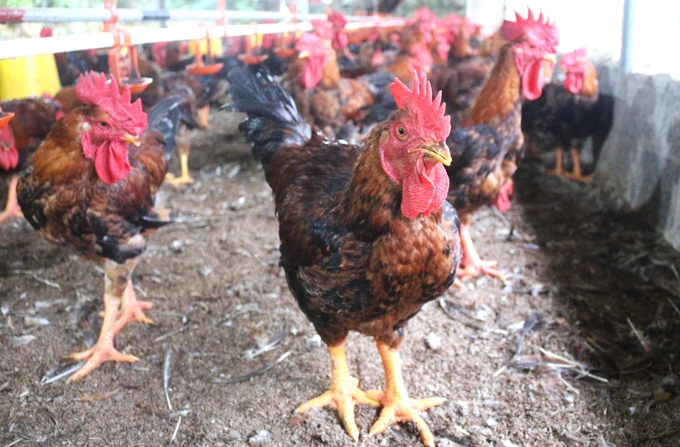
Environmental sanitation and disinfection of livestock farms are the focuses of Thai Nguyen province as the basis for herd restoration. Photo: Pham Hieu.
After completing environmental sanitation and barn repairs, many livestock farmers have begun to restock because as the year ends, the demand for livestock products in the province is forecast to increase by 30 - 40%.
Having a poultry farm that suffered heavy damage in the recent floods, Tran Hai Phong's family (Nam Tien commune, Pho Yen city) is currently making efforts to overcome the losses, urgently cleaning the barn to restock for the next batch of chickens in order to serve the year-end market in time.
Tran Hai Phong said, “We received support in terms of vaccinating livestock against various diseases. Professional agencies have also provided instructions on appropriate distribution and herding to avoid disease outbreaks after floods. Therefore, poultry farmers like us are very confident in this restock period”. He also hopes to receive support when it comes to borrowing capital to restore production in the near future.
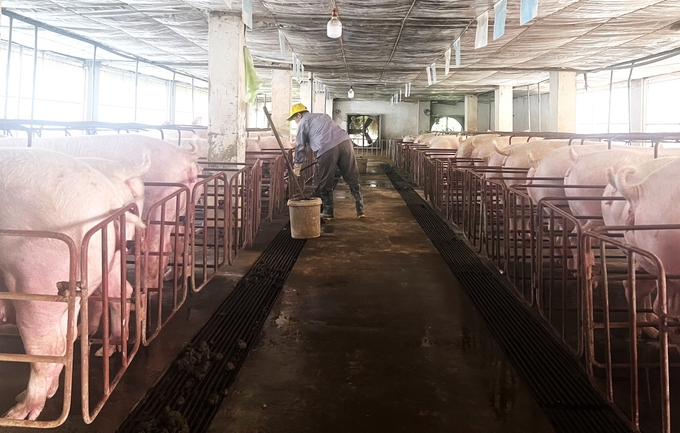
Pig farmers in Thai Nguyen are still hesitant to restock due to concerns about disease outbreaks. Photo: Pham Hieu.
In contrast to the mindset of poultry farmers, most local pig farmers are currently somewhat worried and hesitant about restocking. The case of Nguyen Quoc Hoanh, who has a pig farm in Phuc Thuan commune, Pho Yen city, can be considered a primary example.
“In early June this year, an outbreak of African swine fever occurred in Vo Nhai district with more than 130 pigs infected and suspected of being infected, and more than 3,200 kg of meat had to be destroyed. Not to mention that recently, the provinces bordering Thai Nguyen, Bac Kan and Lang Son, have all suffered outbreaks of African swine fever. Therefore, pig farmers all share the same concern that an outbreak of disease after floods could result in more severe damage than that caused by floods,” he said.
Although knowing the increased demands for food at the end of the year, local pig farmers have determined that they will only restock when the farms ensure disease safety requirements. At this time, Hoang chose to restock slowly while pricking up his own ears, only operating the farm at 50% capacity.
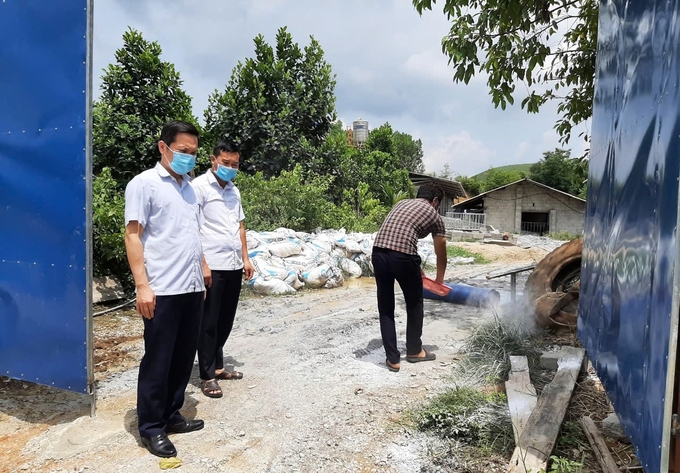
Authorities instruct people to sprinkle lime to disinfect livestock facilities. Photo: Pham Hieu.
Do Dinh Trung, Deputy Head of Thai Nguyen Sub-Department of Livestock Production, Animal Health and Fisheries, said, “Localities have urgently reviewed and calculated losses in livestock and fisheries industries to implement support policies and allocate funds proactively. The immediate goal is to prevent and counter natural disasters as well as animal diseases according to regulations”.
Accordingly, the Sub-Department has requested localities to review and organize the second vaccination session for livestock and poultry in 2024 as per regulations. Special attention should be paid to vaccinating livestock in areas where epidemics have occurred, farms with high risk of disease or where there is flooding. All relevant forces must make sure the vaccination rate reaches over 80% of the total herd at the time of vaccination and the session is completed in October 2024.
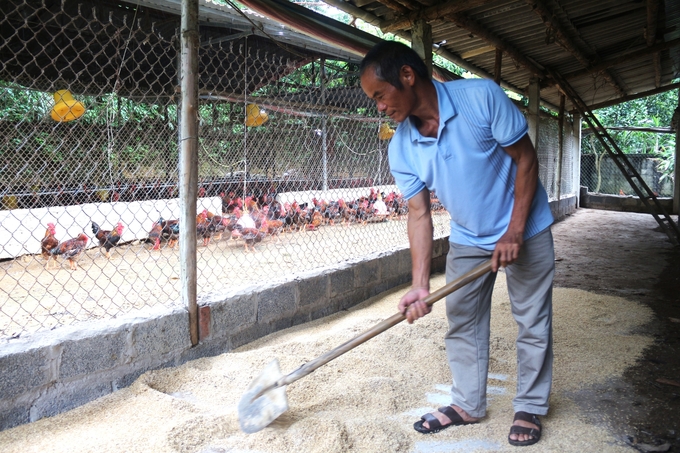
Farmers use biological products to create buffer zones for barns. Photo: Pham Hieu.
Thai Nguyen Sub-Department of Livestock Production, Animal Health and Fisheries has also strengthened the management of quarantine work and control of the transportation of animals and animal products. It promptly detected and strictly handled cases of trading, transporting, and slaughtering animals with clinical symptoms or suspected of having dangerous infectious diseases, cases of transporting animals and animal products without quarantine certificates or traceable origin, etc.
Translated by Samuel Pham

(VAN) WWF, GIZ, IUCN, UNDP call for biodiversity conservation and sustainable development must be regarded as a unity in strategies for a green future.

(VAN) On celebration of International Day for Biological Diversity, Deputy Minister Nguyen Quoc Tri called for practical actions to address nature and biodiversity conservation.

(VAN) Dr. Hoang Thi Thanh Nhan – Deputy Director of the Nature and Biodiversity Conservation Agency – highlighted this on the International Day for Biological Diversity, May 22, 2025.
![Ho Chi Minh city adapts to climate change: [2] Accelerating action](https://t.ex-cdn.com/nongnghiepmoitruong.vn/608w/files/chiqk/2025/05/22/4024-4220-bien-doi-khi-hau-1-100626_766.jpg)
(VAN) Clearly recognizing the challenges posed by climate change, Ho Chi Minh city has swiftly shaped its policies and implemented practical solutions to adapt.

(VAN) Rice straw is no longer just a discarded byproduct, but it is becoming a green resource that helps farmers in the Mekong Delta reduce emissions and promote circular, sustainable agriculture.

(VAN) Other Effective Area-based Conservation Measures (OECMs) are solutions that contribute effectively to achieving the goals of the Kunming–Montreal Global Biodiversity Framework.
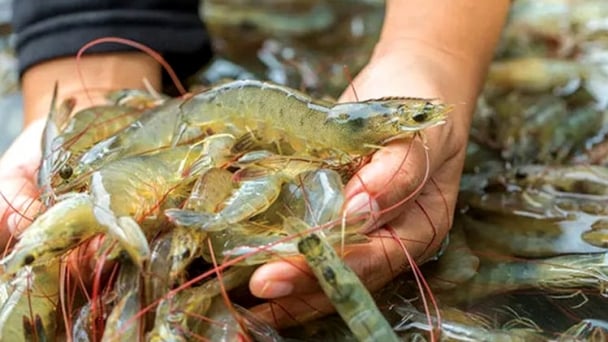
(VAN) A study assessing the carbon footprint of whiteleg shrimp farming in China shows the potential for carbon emission reduction through the use of renewable energy.